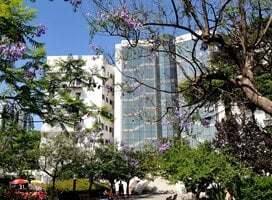Portuguese Language Schools in Portugal
For Portuguese learners, the debate is generally between studying Portuguese in Brazil or Portugal. If you're planning to study Portuguese in Portugal, chances are you're interested in learning the more traditional and formal way of speaking, or want to apply it to a job in Europe or with international relations later on. Not to mention, Portugal (surprisingly) tends to be the more affordable choice of the two.
While learning Portuguese in Portugal, you'll get a chance to immerse yourself in a classic European lifestyle, explore dramatic coastlines, and sample world class wines. Often overlooked, Portugal never fails to win over the hearts of those who visit with its humble Mediterranean charm and warm locals. So what are you waiting for? Get started with your journey to learn Portuguese in Portugal with the list of language schools below and this helpful guide.
Even though Portugal is a small country, it has quite a lot of different accents; the most difficult to understand will be the ones from Alentejo, Madeira, and Azores. Accents from the North and the interior countryside are different from the more traditional Portuguese spoken in Lisbon, but they are quite easy to pick up.
This means, picking the right region is key -- if you’re a beginner to both Portuguese and Portugal, Lisbon, Porto, Coimbra, Faro, and Leiria are great places to start (they all have an easier accent and a lot more diverse cultural offerings).
If you're more advanced with the language and you want to explore a bit more of the Portuguese roots, Guimarães, Braga, Viseu, Guarda, and Évora will be the right balance between language and cultural experience.
Finally, if you want the hardest accent balanced with breathtaking natural sceneries, Funchal (in Madeira), Pico, Terceira, and Ponta Delgada (all in Azores) are great options to consider -- especially if you want to get out of slightly more touristy Lisbon.
If you are a starter, usually a good English understanding will suffice, as this tends to be the teaching language for foreigners. If you are an intermediate or advanced speaker and want to progress to another level, the vast majority of language schools will ask for a certificate that proves you have the skills you claim to have, and some may do a quick oral and written test just to check where you are and deliver a more tailored course.
If you come from the EU, no visas are required for any duration of the stay. If you're from outside the EU, you'll have to apply for a student visa if you plan to stay in Portugal for longer than three months. Check with your local Portuguese embassy the requirements and lead times.
Portugal is cheaper to live in than most countries in Europe, so if you’re on a shoestring budget, you'll be able to get by without too many difficulties. Restaurants tend to be cheap and provide lots of delicious delicacies.
Rent can be expensive in major cities, but the value for money you’ll get is generally quite good. Language courses at schools tend to be pricey due to the high demand, but again, the teaching quality tends to match the price.
Scholarships
One of the best ways to secure some funding is trying to get sponsorship from a local language school or a government body in your country. Alternatively, the Portuguese embassy (website varies from country to country) occasionally starts new exchange and cooperation programs, which will provide some financial support. Some other scholarships to consider:











